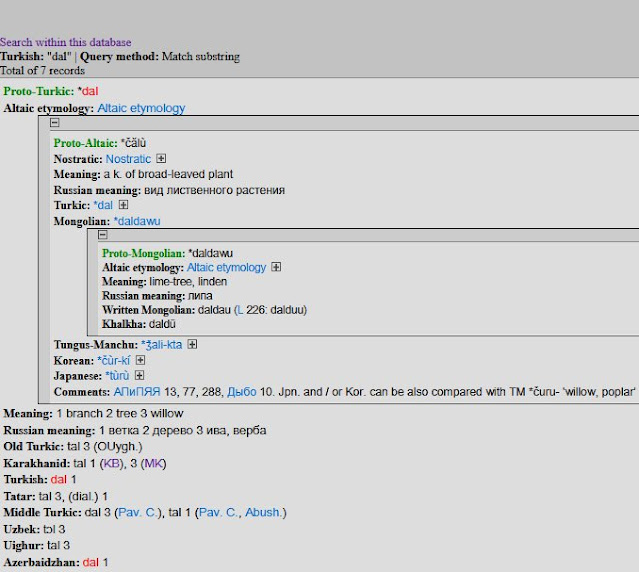Kazım Mirşan, Homeros Anadolu’da konuşulan dillerin hepsini anlayıp bilmese de, bazı sözcükleri anlardı, der.
Homeros 2800 yıl önce, aşağıdaki sözcüğü kullanır/1: θάλος/thalos: sürgün, dal demektir/2 (Ön-)Türkçe ‘dal’ ile hem ses hem anlam olarak aynıdır/3 Bunu görmezden mi gelelim?*
Kazım Mirşan says that although Homer did not know and understand all the languages spoken in Anatolia, but he understood some words.
Homer, 2800 years ago, uses the following word:
θάλος/thalos: means exile, branch (German Zweig)/2
It is the same as (Pre-) Turkish 'dal' both in sound and meaning/3
Should we ignore this?
PICS:
Yukarıdaki örnek Yunanca ve Türkçe’nin en az 2800 (bazı bilim insanına göre 3200) yıl önce iliskide bulunduğunu gösterir.
Bu arada Sami ve Hint-Avrupa dili olmayan Anadolu Hurrice’de ‘tali’nin ağaç anlamına geldiği de önemli olabilir.
The example (word) above dates back to at least 2800 years of Greek and Turkish interaction.
By the way, it may also be important that 'tali' means tree in Anatolian Hurrian, which is not a Semitic or Indo-European language.
*
Bir de Yunan Mitolojisi’nde, Eski Zamanlar’dan kalma, Talos adında, 30 metre boyunda, bir devin varlığından söz ediliyor.
Onu da buraya alsam mı acaba?
Adı θ (th) ile değil T ile başlıyor ama Modern ve Eski Türkçe ‘dal gibi’, boyu boyu uzunlara dendiğini de anımsayalım.
*
There is also a mention in Greek Mythology of the existence of a 30 meter tall giant named Talos, dating back to ancient times.
Should I take him here too?
Its name starts with T, not θ (th), but let's remember that a long person was/is called 'dal(branch)-like' in Modern and Old Turkish.
Uzunbacak Adem










No comments:
Post a Comment
Note: Only a member of this blog may post a comment.